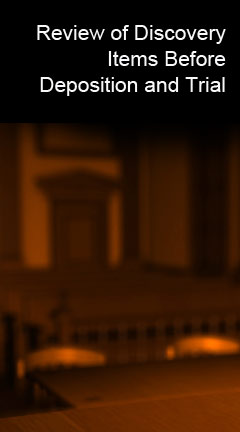Archival Notice
This is an archive page that is no longer being updated. It may contain outdated information and links may no longer function as originally intended.
Home | Glossary | Resources | Help | Course Map
The expert should review discovery items before trial or hearing, particularly in the event that the trial or hearing occurs without an opportunity to first confer with the retaining attorney.
In civil cases, the expert has most likely been provided with copies of interrogatories that he helped answer or draft. The expert should review them before trial. He should also review tests, examinations and pretrial preparation that were the subject of a formal discovery response.
The expert should take sufficient time to review the transcript of his deposition (if one was taken) and the depositions of any concurring and/or contravening experts. All of these documents should be studied by the expert to identify both strong and weak points. This preparation will help the expert anticipate cross-examination at trial.
Additional Online Courses
- What Every First Responding Officer Should Know About DNA Evidence
- Collecting DNA Evidence at Property Crime Scenes
- DNA – A Prosecutor’s Practice Notebook
- Crime Scene and DNA Basics
- Laboratory Safety Programs
- DNA Amplification
- Population Genetics and Statistics
- Non-STR DNA Markers: SNPs, Y-STRs, LCN and mtDNA
- Firearms Examiner Training
- Forensic DNA Education for Law Enforcement Decisionmakers
- What Every Investigator and Evidence Technician Should Know About DNA Evidence
- Principles of Forensic DNA for Officers of the Court
- Law 101: Legal Guide for the Forensic Expert
- Laboratory Orientation and Testing of Body Fluids and Tissues
- DNA Extraction and Quantitation
- STR Data Analysis and Interpretation
- Communication Skills, Report Writing, and Courtroom Testimony
- Español for Law Enforcement
- Amplified DNA Product Separation for Forensic Analysts


